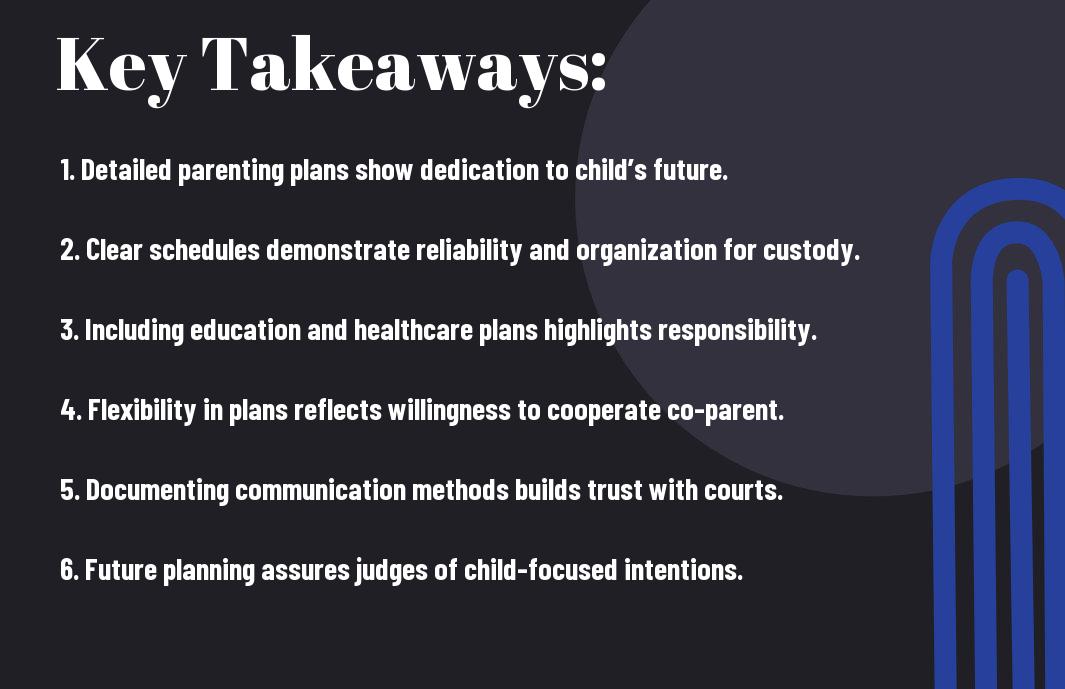Many parents face the challenging task of navigating custody cases while striving to prove their commitment to their children’s well-being. Understanding the significance of future planning and parenting plans can significantly impact the court’s perception of your dedication. By demonstrating a solid and structured approach to your child’s future, including education, healthcare, and emotional support, you can reinforce your role as a responsible parent. This blog post will guide you through the imperative elements of creating effective plans that not only fulfill legal requirements but also showcase your genuine commitment to your child’s best interests. Contact Digital Forensic Squad‘s legal and psychological consultants for assistance with strengthening your custody case.
Key Takeaways:
- Establishing a comprehensive future plan demonstrates a parent’s readiness and capability to provide stability and support for the child’s well-being.
- Detailing specific parenting schedules, responsibilities, and communication protocols in a parenting plan can effectively showcase commitment to co-parenting and the child’s best interests.
- Documenting any proactive steps taken towards parenting arrangements, such as attending workshops or counseling, strengthens a parent’s case in custody discussions.
Understanding Custody Cases
Your journey through custody cases entails navigating the complexities of family law. Court decisions regarding child custody are guided by factors such as the child’s best interests, parental fitness, and existing relationships. Being informed on what constitutes a custody case can empower you to advocate effectively for your child’s welfare.
Types of Custody Arrangements
- Legal Custody: The right to make significant decisions about your child’s life.
- Physical Custody: Where your child primarily resides.
- Sole Custody: One parent has exclusive rights and responsibilities.
- Joint Custody: Both parents share rights and obligations.
- Visitation Rights: Defined times for the non-custodial parent to spend with the child.
Recognizing the nuances in these arrangements is necessary for ensuring your child’s stability and happiness.
| Type of Custody | Description |
| Legal Custody | Decision-making authority regarding healthcare and education. |
| Physical Custody | Where the child primarily lives. |
| Sole Custody | One parent has total responsibility. |
| Joint Custody | Both parents share rights and responsibilities. |
The Importance of Stability
On the path of custody arrangements, the emphasis on stability is paramount. Courts often prioritize providing a stable environment for your child, as it directly influences their wellbeing and development. Factors such as consistent routines, secure living conditions, and cohesive parental involvement contribute to your child’s sense of safety and trust.
Stability is vital during custody cases. A consistent environment allows your child to thrive emotionally and socially, minimizing stress during transitions. Establishing a well-structured plan showcases your commitment to a secure upbringing. Disruptions in their living situation can lead to feelings of instability. A solid case for stability can therefore have a profound impact on the outcome of your custody arrangement.

The Role of Parenting Plans
The role of parenting plans in custody cases cannot be understated; they serve as a vital framework for ensuring the well-being of your children post-separation. These plans stipulate the responsibilities and expectations of both parents, promoting stability and continuity in your children’s lives. By having a well-thought-out parenting plan, you can effectively demonstrate your commitment to co-parenting and fulfilling your children’s needs.
Key Components of a Parenting Plan
By including crucial elements like visitation schedules, decision-making authority, and communication guidelines, you ensure that your parenting plan addresses all the necessary aspects of co-parenting. Such details help minimize conflicts and pave the way for a healthier relationship between you and your co-parent.
Customizing Your Plan for Success
Around the unique needs of your family, customizing your parenting plan can significantly enhance its effectiveness. Tailoring the plan to fit your situation not only fosters cooperation but also promotes a sense of security for your children.
Success in custody cases often hinges on how well you customize your parenting plan. By addressing the specific needs of your family, you lay the groundwork for consistent routines and strong communication. Ensure the plan adapts to changes as your children grow, which helps in reducing conflicts. You might want to involve your children in discussions about their needs, as this empowers them and promotes positive emotional outcomes. Ultimately, a personalized plan reinforces your commitment to co-parenting and enhancing your children’s well-being.
Documentation of Commitment
After a separation, demonstrating your commitment to your child’s well-being is vital in custody cases. Documenting your involvement and future planning can show the courts that you are not only a devoted parent but also dedicated to providing stability and support for your child. This documentation can take various forms, including calendars, schedules, and communication logs, all of which collectively portray your proactive approach in your role as a parent.
Evidence of Support and Involvement
Against any assumptions of disengagement, you can present clear evidence of your active support and involvement in your child’s life. This includes keeping records of school events, extracurricular activities, and any instance where you have provided emotional or financial support. Highlighting these moments reveals your commitment and dedication, underscoring your capability to nurture and support your child’s growth and development.
Maintaining a Consistent Routine
Documentation of daily activities and schedules illustrates your role in providing a stable environment for your child.
Understanding the importance of a consistent routine can significantly impact your custody case. Keeping a structured daily schedule can foster a sense of security and predictability for your child, imperative for their emotional well-being. By maintaining regular meal times, homework sessions, and bedtime rituals, you demonstrate your commitment to providing a stable home environment. Sharing records of these routines not only highlights your involvement but also reassures the court about your capability to prioritize your child’s developmental needs.
Legal Considerations
Despite the emotional turmoil often accompanying custody cases, understanding Predicting the Future: parenting plans can help you present a strong case. Factors such as your child’s best interests, financial stability, and your involvement in their life will be scrutinized during legal proceedings. Familiarizing yourself with custody laws in your jurisdiction enhances your ability to advocate for an arrangement that reflects your commitment and suitability as a parent.
Navigating Custody Laws
Legal considerations surrounding custody can be complex and vary from state to state. You should take the time to fully understand each state’s custody laws, which can determine factors like physical versus legal custody and how decisions are made regarding your child’s upbringing. Comprehensive knowledge will empower you when presenting your case.
Working with Legal Professionals
Below, having a qualified legal professional can significantly impact the outcomes of your custody arrangements. Their expertise in custody law ensures that you are well-informed about your rights and obligations. A skilled attorney will not only help you navigate the legal landscape but also assist you in crafting a persuasive parenting plan that aligns with your child’s best interests.
Custody arrangements can greatly influence your child’s well-being and future. Working with experienced legal professionals allows you to identify the most favorable conditions for your case. They can guide you through everything from filing the necessary paperwork to representing you in court. Their support can be invaluable, as they will highlight important evidence and research that strengthens your position in the custody determination process. Ultimately, a trusted attorney equips you with the tools needed to ensure that your voice and commitment as a parent are clearly presented.

Future Planning Strategies
Unlike some may think, implementing effective future planning strategies can significantly strengthen your parenting plan in custody cases. By demonstrating a well-structured approach to your child’s future, you not only show your commitment but also provide the court with confidence that you are focused on your child’s long-term welfare.
Setting Long-term Goals
Between your child’s educational needs, emotional development, and stability, defining clear long-term goals is necessary. By outlining specific aspirations, you can illustrate your dedication to creating a nurturing environment that fosters growth and well-being for your child.
Adapting to Changing Circumstances
At times, unexpected changes may occur, requiring you to reassess your parenting plan. Being flexible and responsive to new challenges demonstrates your ability to prioritize your child’s needs, ensuring their safety and happiness remain at the forefront of your decisions.
Indeed, adapting to changing circumstances is about recognizing that life can be unpredictable. Your ability to pivot and adjust your parenting plan in response to changes in your job, health, or your child’s needs is vital. Meeting challenges with a proactive mindset not only supports your child’s growth but also shows the court that you are a responsible and caring parent. It is important to keep communication open with your co-parent and adjust your strategies as necessary to provide a consistent, stable environment for your child.
Emotional Well-being for Children
Once again, prioritizing your child’s emotional well-being is imperative during custody cases. A child’s mental health can be significantly impacted by changes in their living situation and parental dynamics. By fostering a stable and nurturing environment, you can help your child navigate these challenges, ensuring they feel safe and supported throughout the transition. This commitment goes beyond mere logistics; it reflects your dedication to their overall happiness and development.
Encouraging Healthy Relationships
Among the best ways to support your child’s emotional health is by encouraging healthy relationships with both parents. Facilitate open communication and collaboration with your co-parent, allowing your child to maintain strong bonds and a sense of security. These relationships can foster resilience and adaptability as your child learns to navigate both homes.
Addressing Emotional Needs
Across various circumstances, it is vital to address your child’s emotional needs, which include feelings of love, acceptance, and security. You should provide them with venues to express their feelings openly and listen attentively, fostering an atmosphere where they feel safe discussing their thoughts. Encourage emotional intelligence by guiding them through their feelings, reassuring them that it is natural to experience a mix of emotions during this transition.
In fact, addressing your child’s emotional needs promotes a healthier adjustment to new living situations. Provide consistent support and validate their feelings, allowing them to express any fears or anxieties they may have. You can introduce coping strategies like journaling or artistic outlets, which can help your child process emotions constructively. Engaging in open conversations about their experiences helps them feel loved and understood, counteracting potential feelings of isolation or confusion. Ultimately, a focus on their emotional landscape is vital for fostering resilience and easing parental transitions.
Conclusion
Drawing together the elements of future planning and parenting plans, you can effectively demonstrate your commitment in custody cases. By outlining structured and thoughtful plans that prioritize your child’s well-being, you not only reinforce your readiness to provide a stable environment but also strengthen your position in legal proceedings. Engage in thorough preparations, consider your child’s needs, and remain proactive in showcasing your dedication. By doing so, you enhance your chances of achieving a favorable outcome in custody arrangements.
FAQ
Q: What is a parenting plan, and why is it important in custody cases?
A: A parenting plan is a written document that outlines how parents will raise their children after separation or divorce. It typically includes details about custody arrangements, visitation schedules, decision-making responsibilities, and how parents will communicate about their children. This plan is important in custody cases because it demonstrates a parent’s commitment to positively contributing to their child’s upbringing while providing a structured framework that promotes stability for the child.
Q: How can I prove my commitment to my child in a custody dispute?
A: To demonstrate your commitment to your child during a custody dispute, you can take several actions. This includes actively participating in your child’s education by attending parent-teacher meetings and supporting their extracurricular activities. Keeping detailed records of your involvement in day-to-day parenting tasks, such as doctor visits, homework help, and recreational activities can also provide evidence of your engagement. Additionally, demonstrating effective communication with the other parent concerning the child’s well-being can further reinforce your commitment.
Q: What factors do courts consider when evaluating a parenting plan in custody cases?
A: Courts evaluate several factors when assessing a parenting plan in custody disputes. These factors may include the child’s age; the emotional and physical needs of the child; the existing relationship between the child and each parent; each parent’s ability to support the child’s relationship with the other parent; and any history of abuse or neglect. Courts aim to prioritize the child’s best interests and, therefore, a well-thought-out parenting plan should address these considerations while maintaining a focus on the child’s happiness and stability.

